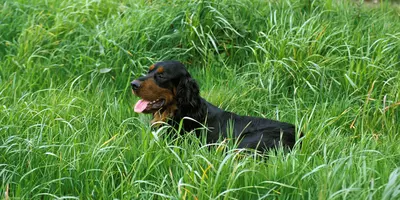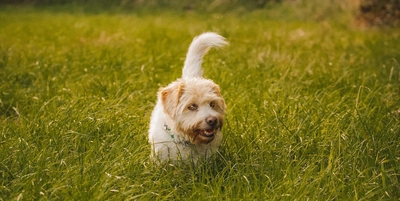Cancer in Dogs
- 21 Dec 2019
- 6m read

Sadly, cancer can touch us all, and receiving the news that your dog has it is devastating. While a lot more research is needed into understanding the causes of cancer in dogs, there are treatment options for many forms of the disease. Tough though it will be, you'll need to try remain positive, follow advice from your vet and do the best you can for your dog. Every year, dogs are successfully treated for many types of cancers thanks to the amazing work of vets across the country.
Signs of Cancer in Dogs
It's important for your dog's comfort that you’re able to recognise when they're in pain and take action quickly. As they can't explain how they feel, you'll have to be observant. Keeping an eye out for a sudden lack of mobility or loss of interest in eating, for example, could be a sign to pick up the phone to the vet. According to The Kennel Club, the following symptoms could be a sign that your dog has cancer, but there could also be another explanation.
Vomiting
Unexplained weight loss
Excessive drinking
Excessive urination
Difficulty urinating
Being tired
Wounds not healing or taking a while to heal
New lumps or change in size or shape of existing lumps
What Causes Cancer in Dogs?
Research into what causes cancer in dogs has so far not been able to make straightforward links with diet and lifestyle. Although, similarly to humans, health professionals would recommend a healthy diet and plenty of exercise to stay in the best physical health.
There have been links between certain breeds and the increased likelihood of developing cancer. However, this is built on a case basis, with most diagnoses coming from these breeds, therefore being recognised as more prone.
Similarly, like humans, exposure to sun can also increase a dog’s risk of developing cancer. Dogs with a thin coat and light skin are at most risk from sun damage. There are things you can do to minimise their risk from exposure, such as avoiding letting them outdoors during peak sunlight hours where the UV index is highest. You can also apply suncream to your dog using specially formulated suncream for dogs.
What Does a Cancerous Lump Look Like on a Dog?
It can be really easy to worry if you spot a lump on your dog, you may worry that it could be cancerous. It’s important to remember that dogs are prone to developing all sorts of lumps and bumps during their lifetime, most of which are usually harmless. If you’re unsure, arrange an appointment with your vet so that they can put your mind at ease and try not to worry until things have been confirmed.
There are a few things you can look out for which may indicate that you should get the lump checked out, such as:
Sudden appearance
Change in size, colour and texture
Rough or bumpy in texture
Discharge
Can Dogs Get Skin Cancer?
Yes, unfortunately dogs can get skin cancer.
It is among the most common types of cancer that occur in dogs. There are several types of skin cancer that can occur in dogs, according to Blue Cross, these are the three most prominent:
Malignant Melanoma
This type of cancer occurs in the melanocytes, which are the cells that produce skin pigment. In humans, this is the kind of cancer that is commonly linked to high exposure of UV light, but its cause in dogs is less clear. It most often occurs around the nose and mouth.
Squamous Cell Carcinoma
This type of cancer most often occurs as a result of exposure to sun. It can sometimes present itself in the form of a minor scratch on the surface of the skin. It can very quickly attack the surrounding tissue of the cells so early detection is really important.
Mast Cell Tumours
This type of cancer is the most common cancer diagnosed in dogs. It occurs in the mast cells of a dog’s immune system.
Cancer Treatment for Dogs
Depending on the type of cancer your dog may be suffering from and its stage, there could be a variety of treatment options available. Don’t be afraid to shower your vet with questions – they know their stuff and will want to see a successful outcome, too. Your dog may even be referred to an oncology specialist who will be able to offer additional support throughout the treatment plan.
How to Help your Dog with Cancer
Keeping a journal will help you track your dog's progress and stay on top of important dates and events. This can include scheduling medication and logging any changes in their behaviour or eating pattern. Not only will this be useful for you but it's also a way to show your dog’s vet how they've been getting on.
When we’re not feeling all that great, one of the best things to do is to make ourselves comfortable. The same goes for your dog and the best place to start is their bed. Pile up cosy cushions so it's perfect for snuggling, adding a heated mat if you think they're feeling the cold more than usual. Make sure they have water within easy reach – staying hydrated is vital for your dog's organ function and recovery.
How Butternut Box Food Can Support Dogs with Cancer
When your dog is unwell, giving them lots of love and being sensitive to how they're feeling is important. This can include making them feel comfortable with a warm bed in a quiet spot. It can also mean giving them something tempting and nutritious to eat, to help get them on their feet and onto the road to recovery. That's where Butternut Box comes in.
If your dog has lost their appetite, offering them a tasty meal is a great way to encourage them to eat. It's also an effective way to support their wellbeing. Butternut Box meals are made with human-quality meat and veg. With plenty of low fat options, as well as vitamins and antioxidants to help support health and vitality. As our food is gently cooked, it's easy to eat and digest. It's tempting smell is an added bonus that might just encourage under-the-weather pooches to take a bite.
At Butternut Box, we know what it's like to be a worried pet parent. While you support your dog, it's easy to forget you might need some help yourself. As a Butternut Box customer, you'll have access to our 24/7 vet-nurse helpline. That means you have somewhere to turn with questions big or small at any time of the day or night.




